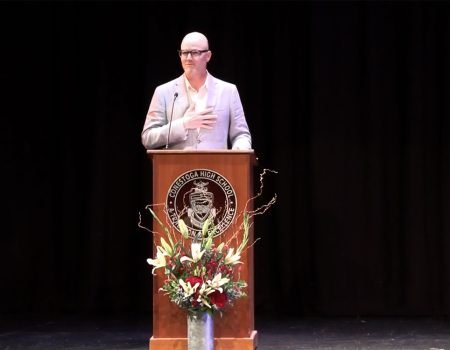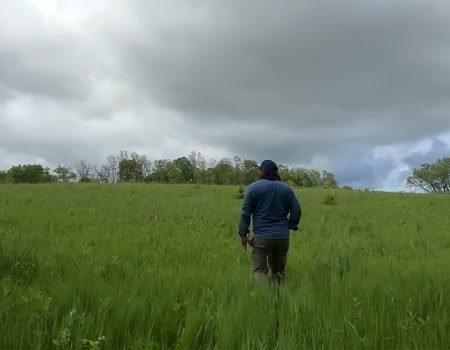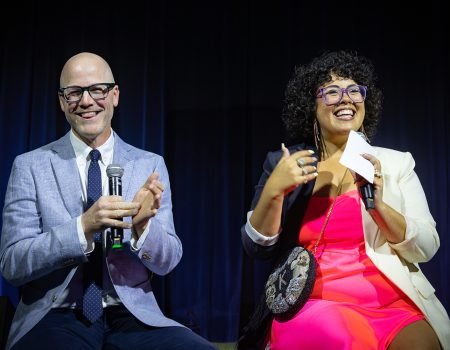Disruption 101
As interesting as the two keynote, three panels, and nineteen CEO product presentations that I’ve seen in the last eight hours have been, I gotta say: I feel kind of depressed.
There have been all kinds of interesting ideas positted here on the second day of OnHollywood. Ariana Huffington talked about the blogosphere as court of appeals. Digg founder Kevin Rose defended his decision to back his usership’s posting of some DVD hack code. Kyte CEO Daniel Graf demo’d his really cool cell phone webcasting application. Motorola CTO Padmasree Warrior (great name, huh?) dashed off some staggering facts, like that there are 32 cell phones sold every second. Heck, as I type, I’m listening to a presentation on “monetizing audience awareness.”
“You’re now seeng the tie in between product placement and ecommerce. You see it, you buy it.”
It’s so conflicting.
On one hand, I look at these guys on these panels — YouTube founder Chad Hurley, or Rose, or Graf — and I think, “Why aren’t you up there? Why aren’t you an innovator? Or, for that matter, a millionaire?”
On the other, I absolutely bristle at all of this talk of monetization, disruption, place shifting, mobilization, personalization, and socialization.
Not once have I heard anyone talk about art. Not once have I heard anyone talk about how the Internet and the Death of Big Media can serve the greater good? Not once have I heard anyone say anything about how the democratization of the tools and distribution formerly locked down by The Man will contribute to the betterment of The Every man.
It won’t surprise you to learn that I’m feeling the ramifications of that decision as I sit here in the dark in these terribly uncomfortable seats wishing I was outside where it’s sunny, crisp and cool.
Here I am in an uber-exclusive spot surrounded by venture cpitalists, media executives, technologists and innovators, and all I wanna’ do is drive a few miles west on Hollywood Boulevard to The Troubadour or west on Sunset to Silver Lake and hang out with the rock stars, actors, poets, drifters, and misfits.
It’s been years and years since I read Wallace Stegner’s “The Spectator Bird.” Still, I am haunted by the the protagonist’s conflict.
“I had been … forced to choose whether I would be a talent broker or a broke talent.”
No one forced me to work for a newspaper instead of playing rock shows 24/7. No one forced me to move to New York instead of staying in Saratoga Springs. No one forced me to work for MTV instead of PBS.
But still, here I am.
Not that no one warned me. Douglas Coupland warned me.
You’re going to go through a really fucked up period for about five or six years now. You’re going to sit and micro-obsess on every decision you ever made, some of which you’ll be grateful for and others you’ll start having regrets over — this is when you start having regrets. You’re gonna become hyper-competitive with every guy you ever meet or read about. Like, you’re competitive but wait until that kicks in. And you’ll probably make one or two super-major life decisions.
So here I am: me and my sore ass, bad posture, and goose bumps (too much AC), micro-obsessing.
All that said (and in case you’re still with me and curious), here’s Wednesday’s OnHollywood news in brief:
Lots of UGC video community aggregate/vertical plays. In other words, lots of YouTubeMySpaceGoogle mashups. Lots of ad serving, broader broadband, personal broadcasting (“personacasting”), monetizing of content in shows (a la Delivery Agent announced its MTV deal). Plus lots of VC.
News panel wasn’t too insightful. Too many from old media (Huffington, Citron) congratulating themselves on embracing “new media.” All agreed, though, that a blend of traditional editorial with community contributors is key. Red Herring founder Tony Perkins said his new website (AlwaysOn, hosts of the conference) keeps users on his site three times longer solely because they’ve encouraged/allowed/enabled them to contribute (comment, blog, etc). And Kevin Rose did publicly announce that he was backing his community on the dvd hack flap that broke Tuesday pm, which drew applause (and which was big news yesterday).
Really great keynote from Motorola cto: by 2010, 55% of online video will be user generated, some 44B streams. There are 32 cell phones sold every second, 1.8B — 3X PC sales — by 2009: dedicated, personalized, always on, always with you.
Sat through a panel on next steps for Akamai/Limelight in terms of serving petabytes of video. In short: they have a lot of scaling to do. P2P will be part of the solution (though they were playing that close to vest).
The only conversation I heard about art (or “content” as the olds like to say) at all came from a tv/studio panel. Excepting the dude from HBO (Carmi Zlotnik) who understood the value of a) quick, cheap and compelling and b) using YouTube et all for marketing, there were no major insights. In fact, Fox TV SVP Stephanie Henning wouldn’t concede that digital has affected how she create TV programming. Weird. Awesome quote from Zlotnik re: YouTube “theft” — “We know that there’s 20% signal theft at HBO, but business is still good.”
The coolest technology I saw? Kyte. The New York Times wrote about it on Monday. He was alos the only dude not in a suit. I liked that.
Some other interesting links:
Me TV
Oddcast
Orb
Pando
Kiptronic
DaveTV
Wednesday: more mobile, UGC, “IM generation” panel, more community/video products, P2P and IPTV.
Cool. (Sigh.)



